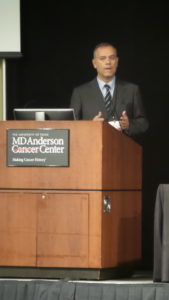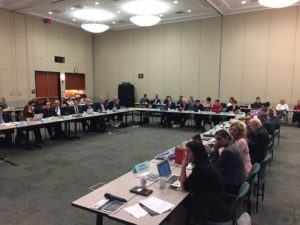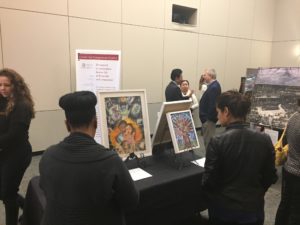by Claudia Sotomayor, Research Scholar of UNESCO Chair in Bioethics and Human Rights
The University of Texas MD Anderson Cancer Center was the host of the Fifth International Bioethics, Multiculturalism, and Religion Workshop and Conference. During three days Bioethical thought leaders from six major religions and ten countries gathered to analyze and discuss the “Bioethical Challenges in Neurogenomics from an Interreligious and Multicultural Perspective.” Previous workshops have successfully taken place in Jerusalem, Rome, Hong Kong and Mexico with the participation of more than 70 prestigious interdisciplinary scholars from around the world.
By gathering experts from Buddhism, Christianity, Confucianism, Hinduism, Islam, and Judaism, a rare space for dialogue was created where an atmosphere of friendship and respect reigned. Such dialogue and encounter allowed the participants to analyze the current bioethical issues posted by Neurogenomics, which is presently at a very exciting crossroad since recent discoveries have challenged the classic model of gene organization and information flow, and for these reasons are improving our self-understanding by providing biological descriptions of how man acts. However, the bioethical imperative remains to articulate how man should act within the relevant phenomenological dimensions described from the rich blend of multi-cultural and inter-religious dialogue.
While each session allotted an hour to spontaneous dialogue in response to the three prepared presentations, the conversation inevitably spilled over into the coffee breaks, and shared meals. Each tradition brought up different and unique views that highlighted the importance of this topic. Dr. Alberto Carrara warned that the “reductionist interpretations of neuroscientific results challenge notions of free will, responsibility, personhood and the self which are essential for western culture and society.”
Dr. Ellen Zhang commented that “Buddhism will question scientism that reduces everything to materials while embracing science as a skillful means to help the world to be a better place.” The conversation was enriched by several topics highlighted by the Scholars like the relationship between Neurogenomics and the Islamic Law posted by Dr. Aasim Padela; the resource allocation problem noted by Dr. Mirko Garasic; and the analysis of the human afterlife form a Hinduist perspective explained by Dr. Deepak Sarma. With a great interest the experts expressed their concerns in setting up the limits to protect the dignity of the human person according to their own cultural/religious perspective.
Dr. Ruiping Fan proposed a familial ethical approach highlighting that “Confucianism holds ethical familialism, emphasizing the inherent value of family continuity, integrity, and prosperity, in addition to individual goods” and that “If this Confucian ethical familialism is taken seriously, we should not make individualist ethical guidelines for the research and application of neurogenetics.”
Dr. Leo Goodstadt, professor at Oxford University, explained in detail the human genome during his presentation. There was also an engaging talk on Public Health by Dr. Umair A. Shah, Executive Director Harris County Public Health Houston, Texas. These presentations where open to the public and encouraged participation of the outside community including public authorities, doctors and other healthcare personnel, teachers, university scholars and students. These talks also provided the scientific tools needed to advance the high level ethical reasoning of the Scholars.
Dr. Chris Durante, Professor of Religious Studies at the New York University, set the tone of the various sessions as academic coordinator of this workshop. Following his indications, participants sought to understand each religious tradition and their manner of arriving at moral norms without engaging in ill-informed, harsh criticisms. Without ignoring their obvious ethical differences, emphasis was placed upon finding bridge concepts that could stimulate continued dialogue and practical collaboration in realizing shared values.
To enlighten not only the mind, but the also the senses, Chair of the Bioethics Art Competition Yvonne Denbina, presented the winning pieces of 2011, 2013, 2015 of the Bioethics Art competition. The images transported the visitors to a deeper understanding of bioethics by the representation of the artists speaking through their images and words, to view the winning pieces visit the website: http://www.bioethicsart.org/. In this site, the information for the 2017 competition titled: A Portrait of Mother Earth and the Challenge of Human Ecology, is available.
The challenging experience of navigating through a complicated and highly technical topic using the lenses of different religious perspectives enabled the participants to share values and attitudes that promoted the dialogue, which fulfilled UNESCO Chair goal of “Fostering the Art of Convergence and Cooperation in Global Ethics.” To continue the international discussion on the various themes raised at the Houston gathering and to prepare for the 2018 workshop and conference, the Fellows participate in the ongoing blog: unescobiochair.wordpress.com, where interested thinkers are welcome to participate and contribute.



